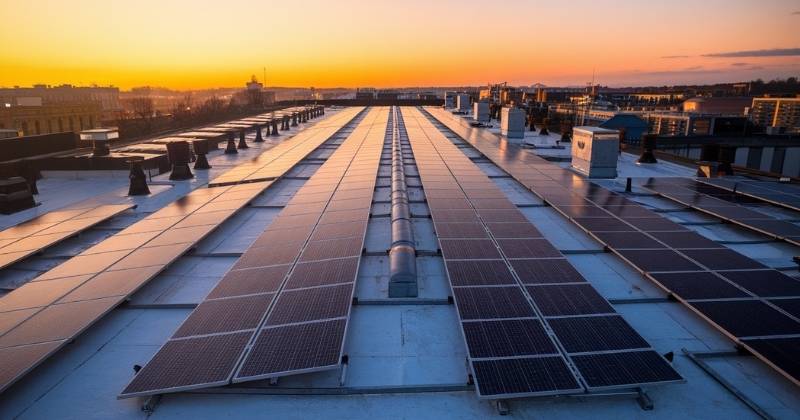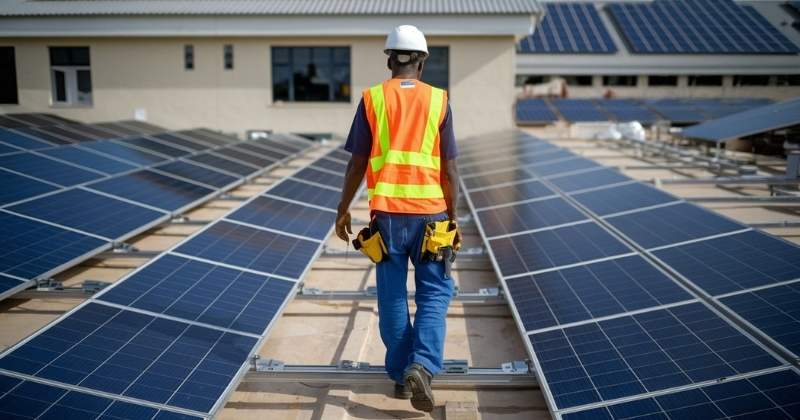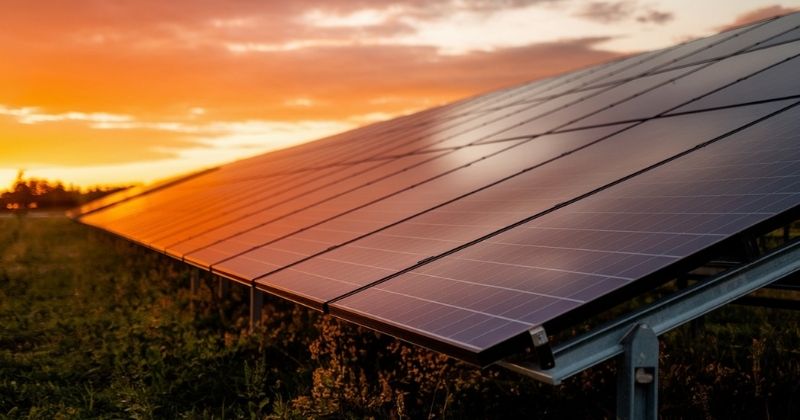
The Electrical Contractors Association of South Africa has warned that individuals who have installed solar power systems may need to budget up to R30 000 to complete the necessary registration process. This information was reported by MyBroadband on 18 March 2025 and has raised concerns among homeowners and businesses relying on solar energy.
Key Takeaways
- Solar registration costs could be as high as R30 000: Eskom requires all grid-tied solar systems to be registered by March 2026, with compliance fees ranging from R20 000 to R30 000, depending on system size and engineering certification costs.
- Unregistered solar systems will be deemed illegal: Failure to comply with Eskom’s new regulations could result in fines, disconnection, or restrictions, raising concerns among solar users who initially invested in energy independence.
- The process includes hidden costs and delays: Solar users must navigate complex compliance requirements, including professional engineering approvals, municipal registration delays, and potential additional fees beyond the initial estimate.
About Arcadia Finance
There are no application fees, and you’ll have access to 19 trusted lenders, all registered with South Africa’s National Credit Regulator. Enjoy a seamless application process with reliable, personalized options designed to fit your financial goals.
Solar Users May Face Significant Costs to Register Their Systems
With South Africans already grappling with the effects of relentless load shedding and skyrocketing electricity costs, the additional financial burden of registration fees has sparked frustration and debate. Many solar users feel they are being punished for trying to become more energy-independent, especially as Eskom struggles to meet the country’s growing power demands.
Previous reports have highlighted that the combination of strict compliance requirements and installation regulations has made it increasingly expensive and challenging for users to legally integrate their solar systems into the national grid. Those who currently own or are considering installing a grid-tied solar system should be aware of the latest rules and potential costs associated with the process.
Before you get buried in paperwork and upfront costs, remember the long game: solar systems pay off. Combine that with smart home habits to cut your electricity bill even further, and your savings will soar.

Eskom Sets March 2026 Deadline for Solar System Registration
Eskom has imposed a registration deadline for grid-tied solar systems, warning that failure to comply could result in financial penalties. The power utility released an official statement on 11 February 2025, confirming that solar users have until March 2026 to ensure their systems are fully registered and compliant with national electricity regulations.
Eskom has also declared that any unregistered grid-tied solar system will now be considered illegal, meaning that users operating such systems without approval may face consequences.
The announcement has sent shockwaves through the solar community, with many questioning whether this is a genuine regulatory effort or simply another way for Eskom to claw back control over independent power generation.
The utility did, however, mention that solar installations up to 50kW might qualify for an exemption from certain registration-related fees until March 2026.
Reports from The South African have previously outlined the registration process that Eskom customers must follow. Those with municipal electricity connections can register their systems using the South African Local Government Association (Salga) platform. This online portal, designed to streamline the registration process, provides an accessible way for users across different municipalities to ensure their systems are properly documented and compliant.
Steps for Registering Grid-Tied Solar Systems
To remain compliant with Eskom’s regulations, grid-tied solar users need to submit specific documents that confirm their system’s technical specifications, safety standards, and installation approvals. This includes proof that the system meets the necessary inverter and battery storage requirements, as well as inspection reports from registered professionals.
The Salga platform provides additional features that are designed to make the process faster and more efficient.
By using this platform, solar system owners can ensure that their grid-tied installations are accounted for and meet national electricity safety standards. Failure to register before the deadline could lead to fines, restrictions, or even disconnection from the electricity grid. Some energy experts have raised concerns that Eskom might use these regulations to force non-compliant solar users off the grid entirely, leaving them without a backup energy source.

Significant Increase in Solar System Registration Costs
The cost of registering a solar system has escalated significantly, particularly over the past year. Since late 2024, Eskom has been actively urging customers to register their systems in compliance with national regulations.
One of the primary cost drivers is Eskom’s requirement that all solar systems be signed off by a professional engineer. This step alone can add tens of thousands of rand to the total cost.
Some homeowners have been left in shock after receiving quotes for these engineering assessments, which in some cases have been nearly as expensive as their actual solar installations. The requirement has also raised questions about whether there are enough qualified professionals available to process the high volume of applications before the 2026 deadline.
Eskom claims that the requirement for Small-Scale Embedded Generation (SSEG) compliance has been in place for some time. However, many solar industry professionals and installers disagree.
Cape Town-based solar installation company AWPower has stated that Eskom had previously not required small residential solar systems to be registered. This change in regulation has resulted in confusion and frustration among solar users who were unaware of the additional costs now associated with compliance.
Solar power doesn’t just cut your energy bills—it can add serious resale value to your home. If you’re planning other upgrades too, read this guide on financing home improvements to make sure you’re investing wisely.
Solar System Registration Fees Could Reach R30 000
The Electrical Contractors Association of South Africa has estimated that Eskom customers with grid-tied solar systems will likely have to pay anywhere between R20 000 and R30 000 to complete the registration process and ensure their installations meet the required standards.
Several factors influence the final cost, including:
- The complexity of the solar system’s installation
- The cost of hiring an accredited engineer to sign off on the system
- The distance the engineer needs to travel to inspect and certify the installation
The investigative news programme Carte Blanche has provided real-world cost estimates, showing how much a solar system owner might need to spend to achieve full compliance. In Tshwane, for instance, a solar power user would need to pay approximately R23 405 to have their system correctly registered and approved.
In some cases, solar users have reported that additional hidden costs emerge during the process, such as unexpected application fees, additional compliance checks, and delays in municipal approvals. Some homeowners have even had to remove and reinstall certain system components to meet newly imposed technical standards.

What This Means for South African Solar Users
As more South Africans transition to solar energy due to rising electricity costs and persistent load shedding, the requirement to register solar systems has introduced new financial and administrative challenges.
The March 2026 deadline gives solar users time to comply with Eskom’s regulations, but the high costs associated with registration may deter some from making the switch. While certain exemptions exist for smaller systems up to 50kW, the majority of grid-tied solar users will need to prepare for substantial expenses to ensure legal compliance.
Many South Africans who have invested in solar power did so to escape Eskom’s unreliable service and avoid excessive electricity tariffs. Now, they find themselves back under the utility’s regulatory control, facing hefty fees just to keep their systems operational.
For those considering installing solar power, it is crucial to factor in not just the installation costs, but also the registration fees and compliance requirements to avoid unexpected financial burdens in the future. While solar remains a valuable long-term investment, the new registration process may add complications that potential buyers need to be fully aware of before making the switch.
Conclusion
The new solar system registration requirements present a significant financial and administrative challenge for South Africans who have invested in alternative energy solutions. While Eskom argues that regulation ensures grid stability and safety, many solar users feel trapped by excessive compliance costs after switching to solar to avoid unreliable electricity supply and high tariffs. With only a year left before the deadline, those affected must carefully assess the full cost of registration, potential exemptions, and necessary steps to ensure compliance—or risk being penalised for their pursuit of energy independence.
Fast, uncomplicated, and trustworthy loan comparisons
At Arcadia Finance, you can compare loan offers from multiple lenders with no obligation and free of charge. Get a clear overview of your options and choose the best deal for you.
Fill out our form today to easily compare interest rates from 19 banks and find the right loan for you.


